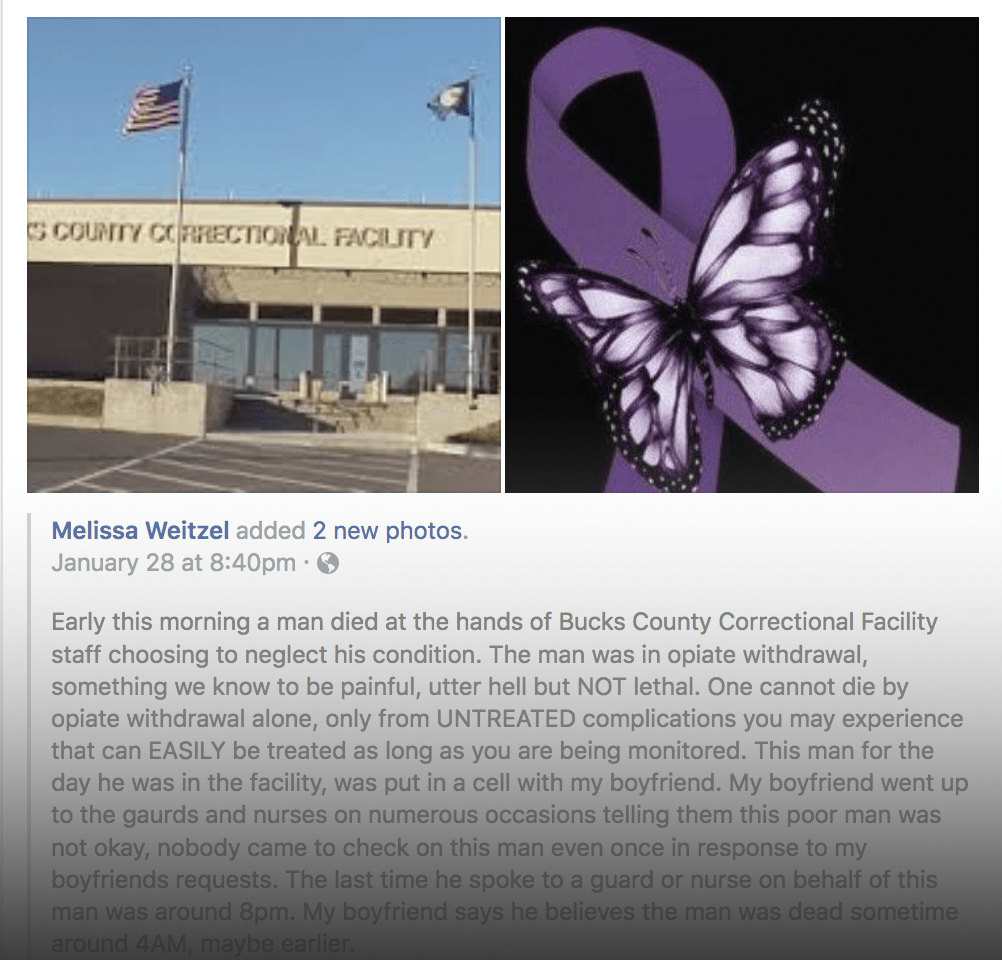Pennsylvania Man Dies In Jail After Guards Allegedly Ignored His Opioid Withdrawal Symptoms
Frederick Adami, a 52-year-old resident of Morrisville, Pennsylvania, died from apparent opioid withdrawal early in the morning on Sunday, January 28, while in custody at the Bucks County Correctional Facility. Adami’s cellmate, Bruce Gramiak Jr., made a phone call to his girlfriend, Melissa Weitzel, the night before Adami’s death to tell her that his cellmate […]

Frederick Adami, a 52-year-old resident of Morrisville, Pennsylvania, died from apparent opioid withdrawal early in the morning on Sunday, January 28, while in custody at the Bucks County Correctional Facility.
Adami’s cellmate, Bruce Gramiak Jr., made a phone call to his girlfriend, Melissa Weitzel, the night before Adami’s death to tell her that his cellmate was displaying symptoms of opioid withdrawal. “We’ve talked every day since he’s been inside and on Saturday night, he said he got a new cellmate who was in really bad shape,” Weitzel, who lives in Bensalem, told The Appeal. “He was throwing up a lot and going to the bathroom and puking all night.”
Weitzel posted her boyfriend’s account to Facebook on the evening of Adami’s death. “At 6:30 in the morning, my boyfriend was woken up by the guards to his cellmates lifeless body on the floor below him,” she wrote. “Keep in mind, there is fecal matter and throw up literally all over the floor and cell and the man is dead.”
A February 2017 investigation by Mother Jones found dozens of cases involving people dying from dehydration due to opioid withdrawal while in jail or prison. “Outside of jails,” wrote Mother Jones’s Julia Lurie, “dying from opiate withdrawal is exceedingly rare because, with few exceptions, it is so preventable. Dehydration, the withdrawal symptom that usually kills people, can be treated with intravenous fluids.” And as Georgetown University Associate Law Professor Shon Hopwood wrote recently, “the biggest danger” to prisoners is not assaults from staff or fellow inmates, but lack of medical care.
The Supreme Court has weighed in on health care in prisons as well. “A prison that deprives prisoners basic sustenance, including adequate medical care, is incompatible with the concept of human dignity and has no place in civilized society,” Justice Anthony Kennedy wrote in favor of Brown v. Plata, a 2011 Supreme Court decision that ruled California’s overcrowded prisons violate the Eighth Amendment’s ban on cruel and unusual punishment.
Opioid withdrawal may also trigger other health conditions to flare up, especially for an older man like Adami. Weitzel told The Appeal that her boyfriend repeatedly asked guards and even one of the facility’s nurses to help Adami. “He said they basically ignored him, and told him not to worry about it.” Adami is the eighth prisoner to die inside the Bucks County Correctional Facility since 2006, according to the Courier Times, a local Bucks County newspaper.
Adami was not arrested for any criminal act, according to Larry King, a spokesperson for the Bucks County DA’s office. “He had two outstanding domestic relations warrants,” King said, adding that typically means money is owed for child support or some other civil payment. “He was sent to prison to be held for an appearance that was scheduled for Monday morning. Unfortunately he passed away in the interim while incarcerated.”
Adami leaves behind five children. His family did not immediately respond to a request for comment.
Bucks County Coroner Dr. Joseph Campbell told The Appeal that an autopsy was completed and the cause of death was inconclusive, pending further testing and investigation. Asked specifically whether dehydration from opioid withdrawal is on the table, Dr. Campbell said there are a number of open possibilities for Adami’s cause of death.
If the facility is found to have neglected him, his family could potentially sue. County jails and prisons have in the past paid millions of dollars to settle lawsuits involving prisoners dying from withdrawal while in custody.
